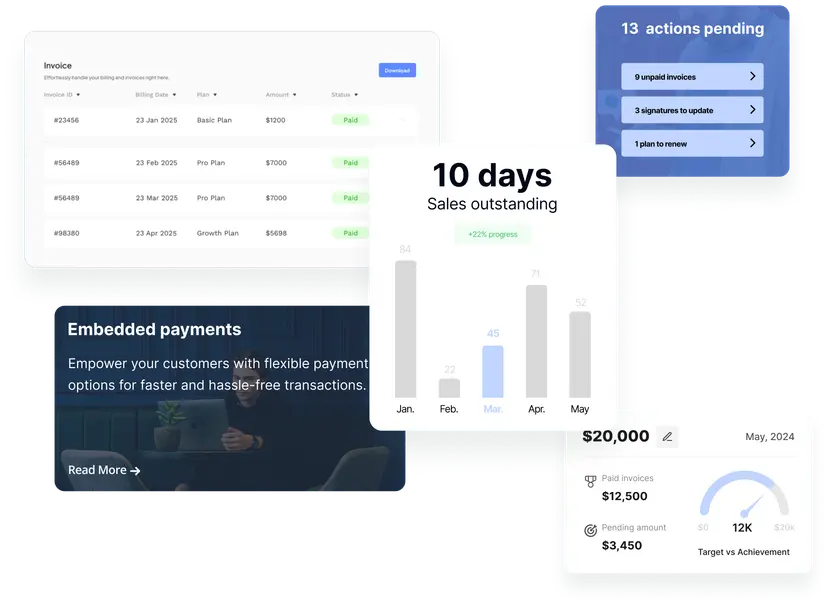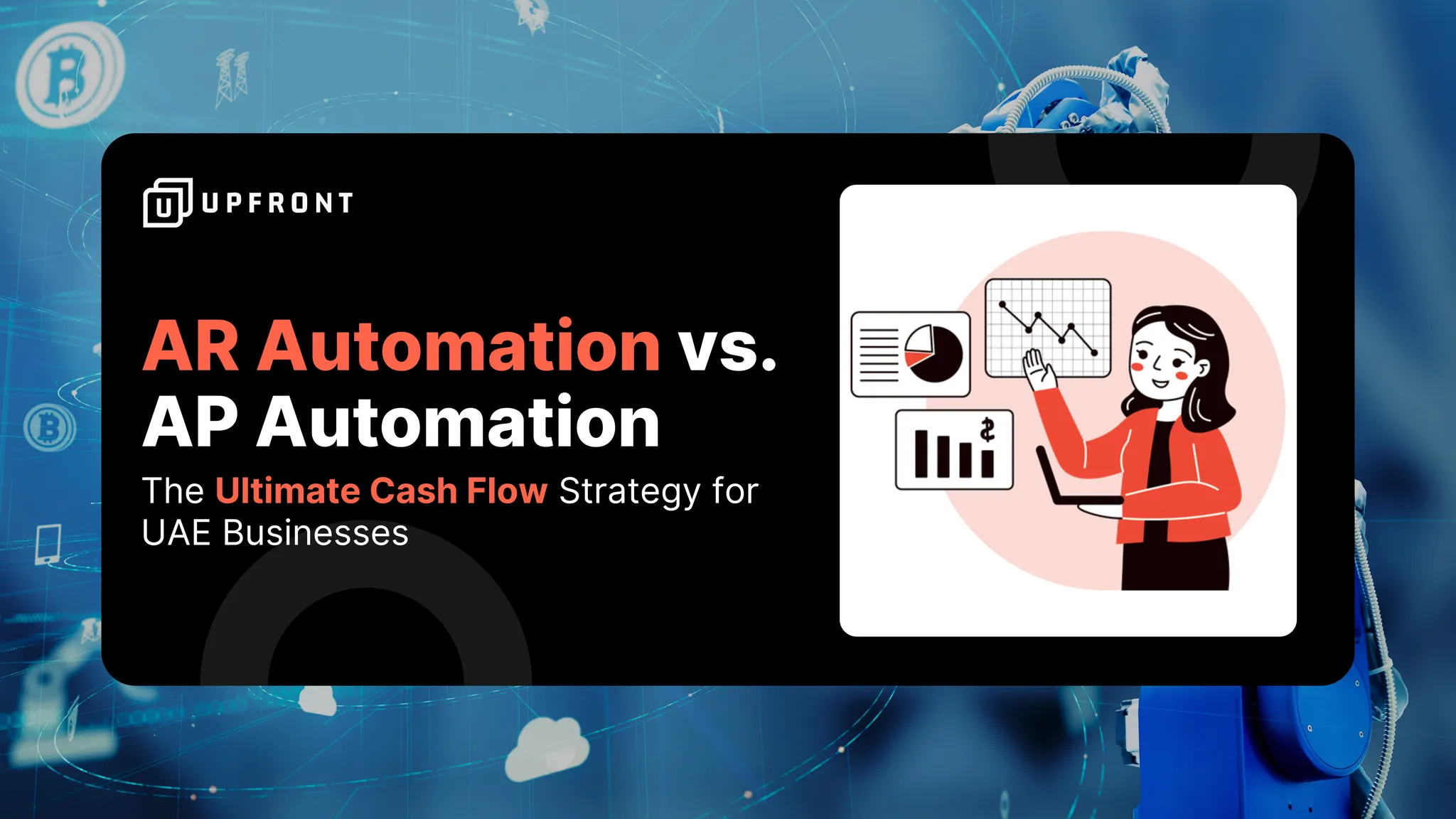What is the goal of making strategic financial decisions?
Strategic financial decisions are the cornerstone of sustainable business growth. Navigating the world of finance successfully requires the right insights and tools. These decisions are informed, data-driven actions designed to maximize long-term value and maintain robust financial health.
By embracing advanced financial management tools and best practices, businesses can respond quickly to market changes, manage financial risks, and capture new growth opportunities.
At the heart of these choices is strategic financial management—a comprehensive approach to managing finances with a focus on long-term business success. For companies looking to improve their financial planning and execution, modern automation platforms like UPFRONT offer powerful accounts receivable management solutions that empower organizations to make smarter, more informed decisions.
This guide breaks down the most important elements of strategic financial decision-making, illustrates key automated strategies, and demonstrates how a proactive approach to finance drives competitive advantage.
What Is Strategic Financial Management?
Strategic financial management is the process of systematically coordinating a company’s finances to achieve its long-range goals. Unlike tactical financial management—which targets daily tasks and operational procedures—strategic financial management focuses on big-picture strategies that maximize profitability and sustainability. This approach ensures your company can adapt to changing markets, making every major decision with clear intent and a data-driven financial strategy.
The Role of Strategic Financial Management in Long-Term Planning
Strategic financial management delivers long-term value, keeping companies competitive and resilient. It includes investment evaluation, risk management, forecasting future financial needs, and aligning organizational objectives with available resources and prevailing market trends. Leveraging financial automation tools streamlines each of these processes, helping your business stay ahead in a competitive landscape.
Strategic vs. Tactical Financial Management: Key Differences
While tactical financial management addresses day-to-day financial activities like handling accounts payable, reviewing budget reports, and tracking cash flow, strategic financial management is about charting the course for sustainable business expansion. Here’s how to distinguish the two:
- Strategic Financial Management: Sets long-term directions, focusing on resource allocation, market expansion decisions, investments, and overall corporate financial policy.
- Tactical Financial Management: Implements the daily processes and actions needed to fulfill bigger strategies, like preparing detailed budgets or optimizing short-term working capital.
Seamless integration of both approaches ensures that your organization balances everyday efficiency with future-focused growth.
What are the key elements of a successful strategic management process?
Successful strategic financial management depends on several core components. Here are the most important to build a strong financial foundation and improve your decision-making process:
1. Financial Planning and Forecasting
Financial planning sets the framework for growth by:
- Establishing measurable financial goals that align with broader aspirations.
- Using cutting-edge financial forecasting software to minimize guesswork and boost accuracy.
- Creating contingency plans for market volatility.
2. Comprehensive Risk Management
Comprehensive risk management identifies, evaluates, and mitigates financial risks. Employ tools like cash flow automation and scenario analysis to enhance your ability to anticipate challenges and safeguard your bottom line.
3. Data-Driven Financial Decision-Making
Adopt data-driven decision-making practices by leveraging real-time financial analytics and automated insights into your company’s cash flow. AR automation and advanced dashboards help you reduce errors, sharpen financial planning, and make more confident choices.
4. Performance Monitoring and KPI Tracking
Track key performance indicators (KPIs) such as DSO improvement and working capital optimization to ensure accountability. Analyzing performance against benchmarks allows your business to spot issues early and make timely adjustments.
5. Leveraging Financial Automation Tools
Utilize financial automation tools—like UPFRONT—to streamline invoicing, collections, and cash flow management. Automation enhances operational efficiency, delivers actionable insights, and gives your finance team more time for value-added, strategic projects.
Strategic Financial Decisions Examples
Strategic and tactical financial decision-making manifests in various business scenarios:
1. Investing in Digital Transformation
A logistics company that integrates AI-powered route optimization software secures efficiency and competitive advantages—demonstrating the impact of strategic investment and intelligent financial planning.
2. Corporate Mergers & Acquisitions
When a tech firm acquires a startup with breakthrough technology, it’s making a long-range financial decision aimed at expanding its market share through calculated investment.
3. Expanding Into New Markets
Retailers that use analytics to identify promising international markets can strategically allocate resources, reducing risk and capitalizing on growth opportunities.
4. Smart Debt Management
Managing and refinancing high-interest debt is a tactical move that supports the overarching strategic aim of lowering capital costs and increasing financial flexibility.
Strategic vs. Tactical: Determines Success
| Financial Activity | Tactical Approach | Strategic Approach |
|---|---|---|
| Accounts Receivable | Manual invoice chasing | Embedded payments + predictive analytics |
| Capital Allocation | Reactive project funding | Scenario modeling with real-time data |
| Risk Management | Annual compliance checks | AI-driven fraud detection + cash reserves |
| Performance Tracking | Quarterly spreadsheet reviews | Live dashboards with KPI alerts |
Example: A Dubai SaaS firm used UPFRONT’s automated reconciliation and dynamic discounting to free up $500K in working capital—funding expansions without debt.
Turn Financial Strategy into Execution
See how UPFRONT automates 90% of tactical finance work—freeing your team to drive growth. GCC-compliant & enterprise-ready.
Optimize Your Financial Strategy →Why is strategic financial management important?
Choosing the best financial strategy is about more than number-crunching. Here’s why both strategic and tactical financial management are crucial:
1. Aligns Business Goals with Financial Resources
Strategic management ensures that growth plans are grounded in reality. Financial forecasting tools help businesses match ambitions to available funds, enabling scalable expansion.
2. Drives Sustainable Growth
Companies that plan for the future and utilize modern finance automation platforms excel at scaling operations and outperforming competitors.
3. Enhances Risk Management
Data-driven strategies pinpoint and mitigate potential risks early. Working capital optimization and real-time analytics solutions strengthen your risk management function.
4. Maximizes Cash Flow Efficiency
Tools like UPFRONT make managing accounts receivable far more effective, resulting in reliable cash flow and improved financial stability.
5. Promotes Informed Financial Decision-Making
Automated platforms deliver actionable insights for everything from investment planning to cost reduction, empowering your team to make smarter, faster, and more strategic decisions.
Strategic vs. Tactical Financial Management: Frequently Asked Questions
What is the difference between strategic and tactical financial decisions?
Strategic financial decisions focus on long-term objectives—such as market entry, capital allocation, and acquisitions—while tactical financial decisions address immediate, short-term actions like budgeting and cash flow adjustments.
What tools support strategic financial management?
Effective strategic financial management depends on:
- Financial forecasting software
- Business intelligence dashboards
- AR automation platforms
- Cash flow automation tools
- KPI and performance analytics dashboards
These tools empower leaders to predict trends and optimize all facets of financial operations.
Who is responsible for strategic financial decisions?
Senior leaders, including CFOs, financial managers, and boards of directors, usually lead strategic financial decision-making, collaborating to set policy, evaluate new opportunities, and keep the business on course.
How does automation support financial decision-making?
Automation reduces manual errors, improves speed, and provides real-time insights into financial performance. Automated accounts receivable and cash flow monitoring help finance teams plan strategically and sustain business growth.
What are examples of strategic financial decisions?
Typical strategic financial decisions include:
- Investment in capital projects or technology
- Expanding into new markets
- Mergers and acquisitions
- Optimizing capital structure
- Risk management initiatives
What are the four types of financial decisions?
The four main types of financial decisions are:
- Investment decisions (e.g., where to allocate capital)
- Financing decisions (e.g., choosing sources of funds)
- Dividend decisions (e.g., profit distribution strategies)
- Liquidity or working capital decisions (e.g., managing cash flows and current assets)
By mastering both strategic and tactical financial management, supported by automation and analytics, your business will be equipped to make the right decisions—both for today’s needs and tomorrow’s opportunities.
→ Growth blueprint: Strategic Financial Decisions → Cycle acceleration: Improve Cash Conversion → Capital strategy: Investment Strategies → Risk shield: Risk Management Strategies → Liquidity engineering: Cash Flow Optimization






